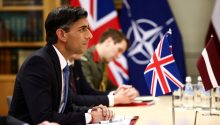by Hugo Dionísio, Strategic Culture:

Europeans, don’t be surprised if one day we wake up to the sound of news like “the war has begun”. This foreshadowing is anything but fanciful and should be taken very seriously. In my ignorance, I even think that in human history, after the Second World War and considering the experience of the Cold War, we are perhaps at the moment when the risk of military confrontation is highest. In the absence of a unifying world architecture, solid democracies and stable, credible communication channels… anything becomes possible.
TRUTH LIVES on at https://sgtreport.tv/
As part of yet another adaptation of the century-old “sword and shield” strategic doctrine, enunciated in 1917 by General Pershing, when he explained to his troops that they were not in Europe to defend Europeans, but to defend Americans, since European countries are a shield and the U.S. is a sword, over the last 30 years, the White House has been building an aristocratic administrative elite, which responds first and foremost to the interests of the American “sword”.
In any closed group, its internal cohesion is based on feelings of belonging, which, in this case, lie in the values of exclusivity, individuality (it’s not for those who want it) and inaccessibility (it’s only for those who can) to ordinary mortals. The great aim and success of the American strategy lies in creating a feeling that each member of the group is part of a chosen structure, which only very special people can join. This feeling is worked out using a variety of communication, suggestion and persuasion strategies aimed at creating a group identity, even when the respective members come from different countries, realities and educational backgrounds.
Let’s take a look at some exemplary, but also paradigmatic cases. Emanuel Macron went through the Institute d’Etudes Politiques de Paris — IEP, which is the seal of trust, the premise, according to which the neoliberal system sees in Macron someone prepared to manage its interests. In addition to the selective character with which this exclusive private institution presents itself, the conventions it maintains with Columbia University in New York and with the always highly reputable London School of Economics, or the master’s course in English for young world promises, represent a powerful contribution of this institute to the neoliberal monopoly cause. It is there that the ideological foundations and propaganda teachings, that are later rooted in political discourse, are created.
For anyone who doubts this description, names like Alain Juppé, Lionel Jospin, Dominique de Villepin, Jacques Chirac, François Hollande and François Mitterrand, all went through the Sciences Po. school at the IED. We can even say that studying at the very select IED is halfway to world stardom and, more importantly, to the public affairs of one of the engines of the EU.
However, this exclusivity is not restricted to the highest representatives of the Western aristocracy. Even the most barbaric and obscure wannabes are obliged to present some kind of connection. Such is the case with Kaja Kallas, the Estonian prime minister, who applies for anything that will get her a job and belongs to any board that will accept her. Kallas went through the necessary Estonian Business School, because business schools here play a fundamental role in the ideological framework of the elected, but, among many other things, Kallas also belongs to the Global Young Leaders organization, a private organization related to universities such as Stanford, of the Ivy League, essentially aimed at STEM training.
Deeply linked to training programs for young people, selected through American structures within universities and schools all over the world, the “lucky” ones chosen from their programs are awarded a whole range of exceptional insignia such as “Innovative”, “Business” or “Leadership”. In programs that range from elementary schools to universities, the “students” learn to move around in the circles of power from a very young age, developing skills linked to the creation of NGOs, companies, parties, how to intervene in governments, the UN and other structures.
Read More @ Strategic-Culture.org




